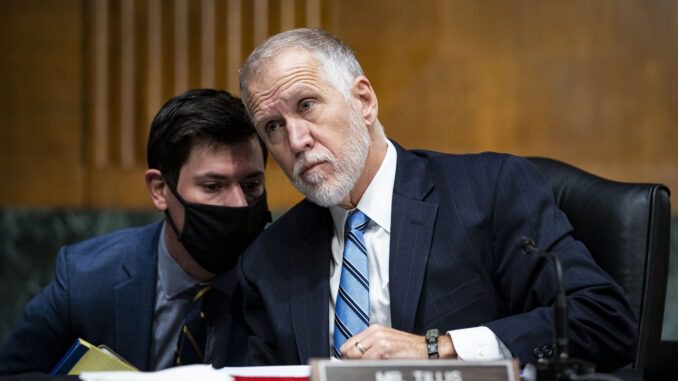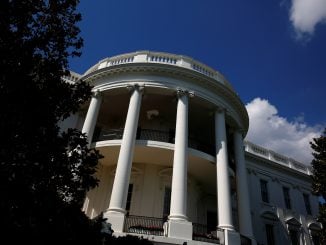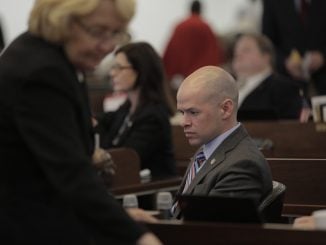
RALEIGH — Despite being unanimously passed by the U.S. House on Nov. 16, H.R. 1964, the Lumbee Recognition Act, has not yet been taken up by the U.S. Senate, which only has about a month left with its current members. If the bill is not advanced out of the Senate Committee on Indian Affairs and then passed by the full Senate and signed into law by Jan. 3, 2021, it will need to be reintroduced in the next Congress.
The Lumbee Tribe, centered around Robeson County near the South Carolina border, was recognized by the state of North Carolina in 1885. They first petitioned the federal government for full recognition in 1888, with mixed results. The Lumbee Act of 1956 did give recognition to the group as an Indian tribe, but under the condition that they not receive any of the federal benefits that other tribes enjoy.
Harvey Godwin Jr, the Lumbee’s tribal chairman, said in a Nov. 25 statement, that the “congressional route is the superior and most effective choice because the reality is, Congress created a statutory ambiguity when it enacted the Lumbee Act of 1956.”
Godwin said the bill is meant “to amend the provision in the 1956 act that prohibits the delivery of services and other benefits to our people.” This change would create a relationship with the federal government that mirrors that of other recognized tribes.
There is bipartisan support from North Carolina’s congressional delegation for this effort, including from Democrat G.K. Butterfield, a bill sponsor, and Republican Dan Bishop, whose district includes the Lumbee’s territory.
“For 64 years, the 66,000-strong Lumbee have existed in a kind of official limbo that reflects the worst of our federal government,” Bishop said while the bill was discussed on the House floor. “For the opponents of Lumbee recognition, including other tribes, it has always been about the money, and of course there have been fellow travelers motivated by racial prejudice or neglect. It cannot be disputed though, that the Lumbee have for three centuries been a cohesive and distinct community of aboriginal origin…”
In the Senate, a companion bill to H.R. 1964 was sponsored by both of North Carolina’s senators, Republicans Richard Burr and Thom Tillis. Senate leadership has not moved to pass either the House version or its Senate companion, and both have been assigned to the Senate Committee on Indian Affairs. Staff for the committee told NSJ on Dec. 1 that they have no plans for further committee meetings this year.
“Senator Tillis is encouraged by the bipartisan support Lumbee recognition has garnered, and he will continue working with Senator Burr to pass the Lumbee Recognition Act in the Senate and make it the law of the land,” said Tillis communications director Daniel Keylin to NSJ on Dec. 1 when asked about the bill’s chances to pass in the Senate before this Congress expires.
Likewise, a Burr spokesperson told NSJ, “Senator Burr remains committed to securing the long-overdue federal recognition of the Lumbee Tribe. We applaud the House’s passage of the Lumbee Recognition Act, and we look forward to the Senate taking up the bill as soon as possible.”
Senate staff familiar with the process told NSJ only COVID-related legislation and bills that can be added unanimously to the omnibus are likely to pass before the end of session. It is still possible for the Lumbee Recognition Act to be put into the omnibus, even without being advanced through the Committee on Indian Affairs, but a single member standing in opposition could sink its chances.
In addition to possible issues with the clock running out on the session, the bill is seeing opposition from one significant party — the state’s only current federally recognized Indian tribe, the Eastern Band of Cherokee Indians (EBCI).
The EBCI’s principal chief, Richard Sneed, along with the chief of the Mississippi Band of Choctaw Indians (MBCI), Cyrus Ben, co-wrote a letter to House leadership before the vote, saying, “For over a century, the Lumbees have claimed to be Cherokee, Croatan, Siouan, Cheraw, Tuscarora, and other unrelated tribes but have never been able to demonstrate any historical or genealogical tie to any historic tribe.”
A large part of the Cherokee and Choctaw opposition, according to their letter, is due to the “devastating impacts” that including another large tribe into the federal system would have “on Tribal Nations reliant upon federal health care, education, and other services provided through the Indian Health Service (IHS) and Bureau of Indian Affairs (BIA).”
After the unanimous vote in the House, Sneed released another statement, again throwing the Lumbee’s Indian heritage in doubt. Sneed argued the issue should be dealt with at the Office of Federal Acknowledgement in the Department of the Interior, not by Congress, because the Lumbee need to prove their Native ties.
“When such doubts exist, there is an established process in place to examine the historical records and genealogy to validate petitions for federal recognition,” Sneed said in the statement, provided to NSJ by the EBCI. “The use of congressional authority to ignore and avoid investigation of such serious questions about the Lumbees’ authenticity is an outrageous injustice to all federally recognized Tribes.”
But Godwin says the Lumbee have been answering these questions for centuries: “Perhaps no other Indian group has been more scrutinized, studied and analyzed than the Lumbee. And as I speak to you today, I say it’s time we end this madness and let the Lumbee people stand next to its sister tribes across America.”
Godwin says H.R. 1964’s purpose is “to right an injustice that has been perpetrated on the Lumbee people for over 100 years.”
Aware that their main opposition comes from North Carolina’s Cherokees, Godwin made a veiled reference to “those who have opposed us on our efforts,” saying, “I would never criticize another tribe,” and especially not during the month of November, which is American Indian Heritage Month.
“But to the very few detractors to our efforts and to our impending bill, I say that our people have been patient for over 130 years trying to right the injustice we experience every single day,” Godwin continued. “For us, this is about more than federal programs, jurisdiction or land; this is about respect. Almost 600 other tribes share this special relationship with the United States that we are prepared to share. And many of them support our efforts.”
If the Senate passes H.R. 1964 before Jan. 3, 2020, or its companion bill S. 1368, which has been sitting in the Committee on Indian Affairs since May 2019, President Donald Trump is expected to sign the act, as he made frequent promises to the Lumbee to do so.



